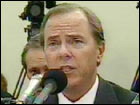|
Skilling: It wasn't me
|
 |
February 7, 2002: 7:33 p.m. ET
Ex-Enron CEO says he did not dump stock, hide debt through transactions.
By Luisa Beltran
|
NEW YORK (CNN/Money) - Former Enron Corp. CEO Jeff Skilling repeatedly told a Congressional panel Thursday that he knew nothing of any off-the-books partnerships Enron Corp. used to hide debt.
Skilling, in nearly three hours of testimony before a House Energy and Commerce Committee, appeared unshaken by most of the questions posed by Congressional investigators.
"When I left on Aug. 14, I thought the financial reports accurately represented the financial [state] of the company," Skilling said.
Skilling admitted he was a "controls" freak but said there was no way for him to know all that was going on at the once-powerful energy trader. He repeatedly denied knowing about transactions that Enron used to hide nearly $1 billion in debt.
|  | |
 |
 |
 |
| |
 Skilling testifies about Enron.
Skilling testifies about Enron.
| |
 |
"Enron Corp. was an enormous corporation," he added. "Could I have known everything going on in the company?"
Instead, Skilling blamed Enron's collapse on liquidity problems. "There are things called a run on a bank. You can have a fundamentally solvent company that has a liquidity problem," he said.
Earlier Thursday, Enron's new Chief Operating Officer Jeff McMahon told the Congressional panel that he was transferred from his position as treasurer after complaining to Skilling about conflicts posed by Enron's partnerships. Skilling refuted the claims and said that McMahon was only interested in his compensation.
"Jeff felt he was being put in an awkward position having to negotiate with Andy [Fastow] and that this may impact his compensation package," Skilling said.
Enron's former Chief Financial Officer Fastow is credited with being the chief architect behind Enron's web of corporate partnerships. Fastow also had interests in the partnerships and took away $30 million in profit from them, according to investigators and a special report from Enron's independent directors.
Skilling testified that there was no "handshake deal" between him and Fastow that would have guaranteed Fastow a rate of return on his investments.
Enron Corp.'s former in-house lawyer Jordan Mintz testified that he repeatedly tried to talk to Skilling regarding conflicts of interests pose by Fastow financial interest in the partnerships. However, Mintz said he was consistently rebuffed.
Enron's various transactions required the approval of Skilling and other executives. However, Skilling did not sign many of the forms, Mintz said.
Skilling admitted that the company knew a private equity fund was being established and that Fastow would have an economic interest in it.
"I didn't sign the documents because they were not given to me," Skilling said.
Skilling is devastated
In opening remarks, Skilling told the House Energy and Commerce Committee that he was not aware of any financing arrangements designed to conceal liabilities or inflate profitability while he was at Enron. Skilling said that when he left Enron last August he had no idea the energy trader was on the verge of collapse.
"At the time I left the company, I fervently believed that Enron would continue to be successful in the future -- I did not believe the company was in any imminent financial peril," he told the hearing.
He added: "I did not dump stock in Enron because I did not know or suspect that Enron was in any trouble."
Skilling faced tough questions from at-times highly skeptical lawmakers about his role at what was once the nation's seventh-biggest company.
"Mr. Skilling, a massive earthquake struck Enron right after your departure. People in far inferior positions to you could see cracks in the walls, feel the tremors, feel the windows rattling. And you want us to believe that you sat there in your office and had no clue that this place was about to collapse?" asked Rep. James Greenwood (R-Pa.), chairman of an oversight and investigations subcommittee.
Skilling replied: "On the day I left ... I believed the company was in strong financial condition."
Enron's bankruptcy filing on Dec. 2 -- the biggest in U.S. history -- cost thousands of employees their jobs and many more with Enron stock in their 401(k) accounts much of their life savings.
Skilling also refuted some of the findings in a recently released report from an independent group of Enron directors. The report criticized Skilling for not taking a more active role at the company.
"I believed at the time that adequate controls were in place and that the controls were complied with," he testified. "I did not have any knowledge that the transactions were designed to conceal loss."
Skilling also expressed sorrow at the loss of Cliff Baxter, former Enron vice chairman who committed suicide last month and whom Skilling called his "best friend." (598KB WAV)(598KB AIFF)
"I am devastated and apologetic about what Enron has come to represent," Skilling said. "Too many people have been hurt too much." 
|
|
|
|
|
|

|

